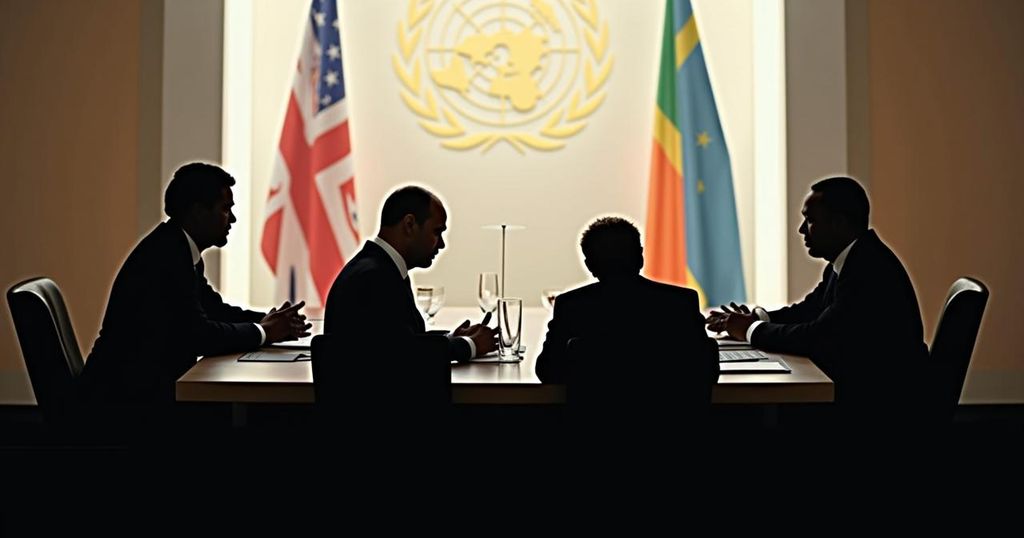The Challenge to the One China Principle by Four Small States at the UN General Assembly

Four small nations—Marshall Islands, Eswatini, Palau, and Paraguay—recently requested Taiwan’s inclusion in the UN system at the General Assembly, challenging the established One China Principle. This request is viewed as both legally dubious and potentially influenced by ties to the United States. The article critiques these actions as reckless and indicative of broader geopolitical manipulations that could escalate tensions with China, despite the reaffirmation of the One China Principle as a fundamental tenet of the UN.
The recent United Nations General Assembly in New York has become a focal point for various geopolitical discussions, particularly amid global tumult. Prominently featured are serious issues such as the ongoing conflict in Gaza and Ukraine’s military actions. However, a noteworthy and somewhat perplexing incident involved four diminutive states—Marshall Islands, Eswatini, Palau, and Paraguay—requesting Taiwan’s inclusion in the UN system at the inaugural Summit of the Future. This request raises significant questions given China’s existing representation and its position as a permanent member of the UN Security Council. To unpack this, one must consider the historical context; Resolution 2758, passed in 1971, firmly states that there is only one China and that Taiwan is a part of it, as further affirmed by the Cairo Declaration and the Potsdam Proclamation. The One China Principle has been a cornerstone of UN operations, asserting that all member states must adhere to this guideline to maintain their membership. It is widely acknowledged that certain powerful nations have historically undermined this principle, encouraging Taiwan’s independence narrative. Thus, witnessing smaller states, such as the Marshall Islands, challenge a principle they initially accepted upon joining the UN is deeply troubling. It evokes the imagery of a minor nation audaciously asserting that one of its islands should also receive representation at the UN—an assertion both surreal and legally dubious. Furthermore, a closer inspection of the Marshall Islands reveals its historic ties to the United States, characterized by the 1983 Compact of Free Association, and the use of the US dollar as its currency. These connections with the U.S. might imply that financial incentives could have influenced their stance in New York, leading them to advocate for something that contradicts established UN norms. China has maintained a clear position regarding any attempts to undermine the One China Principle. The actions of these four small states might seem imprudent, as they engage in what could be construed as diplomatic warfare against a global powerhouse. This scenario mirrors Peter Seller’s satirical movie, “The Mouse that Roared,” where an insignificant nation confronts a superpower—though in real life, such actions appear reckless and could escalate conflicts rather than resolve them. This episode reflects broader concerns over the manipulation of minor states for anti-China rhetoric, suggesting that the U.S. is conscious of China’s significant power. President Biden’s comments about peace in the Taiwan Strait, compared to Eswatini’s bold stance, indicate a strategic hesitance from larger powers. Ultimately, the One China Principle remains a foundational element of the UN framework, one that even the smallest states have accepted upon entering. Anything contrary to that serves not only as an illegal maneuver but also as part of a broader strategy that risks further destabilizing an already frail geopolitical landscape afflicted by wars and crises.
The article discusses the recent participation of four small states—Marshall Islands, Eswatini, Palau, and Paraguay—at the United Nations General Assembly, wherein they advocated for Taiwan’s inclusion in the UN system. This request is seen in light of the historical One China Principle established by prior UN resolutions, which asserts that Taiwan is a part of China. The article explores the complexities of international relations, especially regarding how smaller nations align their foreign policies and rhetoric in response to powerful nations, particularly the role of the United States in this dynamic.
In conclusion, the actions of the Marshall Islands, Eswatini, Palau, and Paraguay to challenge the One China Principle at the UN suggest a troubling departure from established international norms. Their requests, arguably influenced by external pressures or incentives from larger powers, not only defy their own previous commitments but also threaten to escalate diplomatic tensions with China. The integrity of the One China Principle remains uncontested within the UN system, indicating that any deviation serves as a potential catalyst for broader instability in an already volatile global environment.
Original Source: europeansting.com








